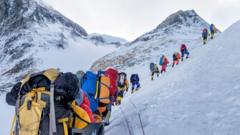Nepal has announced a 36% increase in the fees required to scale Mount Everest, marking the first hike in nearly ten years. Starting this September, climbers will face a cost of $15,000 (£12,180) for permits to climb during the prime April to May window. The fees for other seasons will also see a significant rise, costing $7,500 from September to November and $3,750 from December to February.
This adjustment arises as the income generated from these permits is vital to Nepal's economy, where mountain trekking and climbing account for over 4% of the country's GDP. Critics have long pointed to the problem of overcrowding on Everest, with the government approving roughly 300 climbing permits each year. The recent fee increase has been under consideration since last year, though it remains uncertain whether higher costs will deter climbers.
Narayan Prasad Regmi, the director general of the Department of Tourism, emphasized that the royalty fees had not been updated for an extended period. Still, he withheld details on how the additional revenue would be utilized. British climber Kenton Cool, who has summited Everest multiple times, commented that the fee hike is unlikely to dissuade passionate adventurers, hoping for better utilization of the funds generated.
In a move geared towards preserving the majesty of Everest, the Nepalese Supreme Court had ordered the government to limit permits, highlighting the need to respect the mountain's capacity. Concerns about climber safety have been rampant, especially with incidents of climber congestion leading to perilous situations at the summit. Consequently, the Nepalese army has undertaken annual clean-up operations since 2019 to address the significant waste accumulated on the mountain, successfully recovering 119 tonnes of debris, along with human remains sporadically uncovered over the years.
Nepal is home to eight of the world's fourteen highest peaks, including Everest, highlighting its immense significance in the global mountaineering landscape. As the climbing community rallies for both the environment and safety measures, this fee increase may prompt a necessary dialogue on sustainable tourism in the region.
This adjustment arises as the income generated from these permits is vital to Nepal's economy, where mountain trekking and climbing account for over 4% of the country's GDP. Critics have long pointed to the problem of overcrowding on Everest, with the government approving roughly 300 climbing permits each year. The recent fee increase has been under consideration since last year, though it remains uncertain whether higher costs will deter climbers.
Narayan Prasad Regmi, the director general of the Department of Tourism, emphasized that the royalty fees had not been updated for an extended period. Still, he withheld details on how the additional revenue would be utilized. British climber Kenton Cool, who has summited Everest multiple times, commented that the fee hike is unlikely to dissuade passionate adventurers, hoping for better utilization of the funds generated.
In a move geared towards preserving the majesty of Everest, the Nepalese Supreme Court had ordered the government to limit permits, highlighting the need to respect the mountain's capacity. Concerns about climber safety have been rampant, especially with incidents of climber congestion leading to perilous situations at the summit. Consequently, the Nepalese army has undertaken annual clean-up operations since 2019 to address the significant waste accumulated on the mountain, successfully recovering 119 tonnes of debris, along with human remains sporadically uncovered over the years.
Nepal is home to eight of the world's fourteen highest peaks, including Everest, highlighting its immense significance in the global mountaineering landscape. As the climbing community rallies for both the environment and safety measures, this fee increase may prompt a necessary dialogue on sustainable tourism in the region.

















